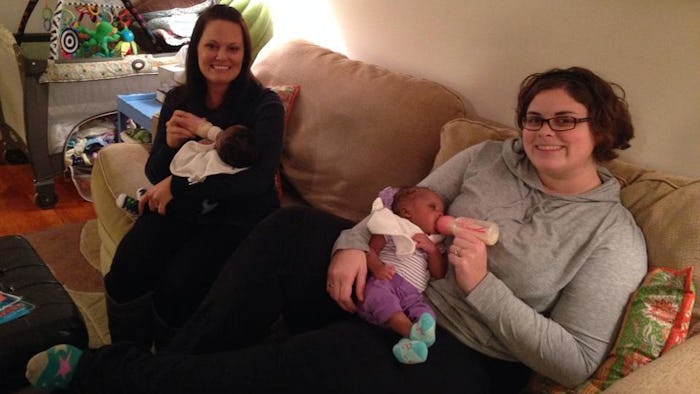When we decided eight years ago to build our family via adoption, we knew that many parts of our journey to parenting would be different. Paperwork instead of pregnancy tests, social worker visits in lieu of OB-GYN visits. I fully embraced our chosen path to parenthood, despite how different it was than many of our friends’. What I didn’t expect, though, was how differently the placement of a child into our family would be viewed by my workplace. At the time we found out that our oldest child would be joining our family in 2011, I was a county caseworker employed by the state Civil Service Commission. A government employee. A fantastic job with great benefits, I never dreamed about the questions I would face when broaching the subject of maternity leave as an adoptive mother.
We were “matched” with a baby due October 30th. A coworker in my department was pregnant, and also due October 30th. As she planned for three months off to recover and adjust to new parenthood, I broached my own leave and was met with blank states by my supervisor.
“So, will you need like, a long weekend? 3-4 days off?”
We were preparing to bring home a newborn child, our first child. Our world was about to be turned topsy turvy. I needed a bit more than a long weekend.
I quickly was advised by family and friends that I was entitled, at the placement of an adoptive or foster child, to up to 12 weeks of unpaid FMLA under federal law. The short-term disability that would provide six weeks of (partial) pay to my coworker did not apply to me in our state. Only four states — Washington, Rhode Island, New Jersey, and California- provide any type of paid leave for the adoption or foster placement of a child. I was eligible therefore to use my accrued paid time off hours after his birth — about two weeks. We decided then as a family that we could handle an additional three weeks off unpaid before financial crisis would ensue. So, I applied for five weeks of FMLA. I was met with shock and groans from my boss.
You aren’t giving birth.
You don’t have anything to recover from.
Why do you need this time off?
Nonetheless, I persisted with the time I was guaranteed under the law. When I learned that our daycare did not accept children until 12 weeks of age, I made an additional amendment to my request. I would extend my FMLA the full 12 weeks, but would work only three days per week after week 5. This would allow my mother to watch our son part-time for us until he was able to go to daycare. My supervisors approved this, and seemed satisfied that I would be back, at least part time, without taking my full 12 weeks FMLA.
I never quite recovered from my crash course into working motherhood.
At 5 weeks old, I dropped our newborn son off to my mother, and returned to the office. I dove right back into the fray. As a caseworker that was supposed to have a workload of 35 cases, I often had many more. Returning from FMLA, I took back on the weight of 70 cases of special needs children. Despite working only half-time for the next seven weeks, I had my full workload placed back into my lap. Trying to do my more-than-40-hour-per-week job in only 24 work hours per week, I was drowning. Up all night with an infant, fitting in post-placement social worker visits, and adjusting to life as a new mom. Working full-time in half the time. No wonder adoptive moms experience post-adoption depression at the same rate that biological moms experience postpartum depression. When I complained or vented about falling behind, I was met with little grace.
I never quite recovered from my crash course into working motherhood. By the time my son was a few months old, I was so behind the curve at work that I felt I would never catch up. I was short-changing my clients, who deserved quality case management. I was short-changing my child, and myself. I quit in a huff when he was six months old, and pursued a self-employed career with contracted and freelance gigs for years after that. I continue to do so now.
It was the right move for us at the time, though further complicated the births of our next children. When our twins (now 5) and our youngest (3 months) were placed with us, I had literally no paid leave whatsoever. No accrued sick time, nothing. This meant I took virtually no time off after they were born, at all. Working part time, I certainly had many hours at home with them, but still needed to accept contracts and assignments to maintain my client connections. I was editing an article in the waiting room while my youngest child was being born.
The U.S. is behind every other developed country in parental leave for everyone, whether by birth or adoption. In the UK, parents are entitled to 90 percent of their pay for at least 26 weeks after the placement of a child. But in the U.S., adoptive and foster families are often short changed even further, as their transition to parenthood isn’t viewed the same. Despite proposed changes to parental leave in this country, nothing is guaranteed.
Parents like myself, facing huge life-altering events, are left floundering to find a way to navigate these huge changes and adequately support their new child. Perhaps eventually the U.S. will catch up with our counterparts, but in the meantime adoptive parents will continue to follow a path different from families formed by biology.
